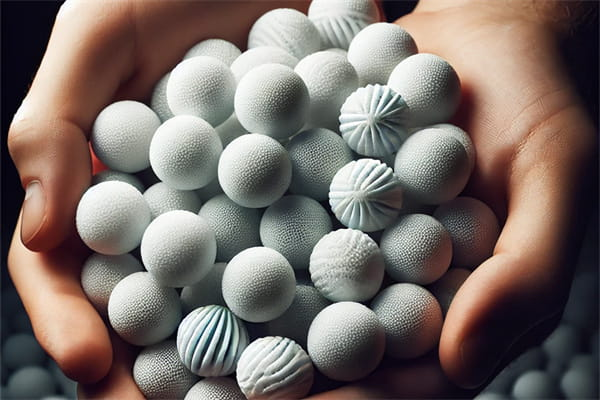When it comes to maintaining crystal clear water in your swimming pool, aquarium, or industrial water system, choosing the best filter balls is crucial. These innovative filtration media have revolutionized the way we think about water filtration, offering a more efficient and eco-friendly alternative to traditional sand filters. But what exactly makes a filter ball the best? In this blog post, we’ll explore the key features that set the best filter balls apart from the rest.
Ⅰ. Material and Manufacturing Process
Material Quality
Durable Materials: High-quality filter balls are typically made from durable, non-toxic materials such as polyethylene or polyester. These materials are chosen for their ability to withstand harsh conditions and maintain their structural integrity over time. Polyethylene, for instance, is known for its robustness and resistance to wear and tear, making it an excellent choice for filtration media.
Chemical Resistance: Another critical aspect is chemical resistance. In many filtration systems, the media are exposed to various chemicals used for cleaning and maintenance. The best filter balls should be able to resist degradation from these chemicals, ensuring they last longer and continue to function effectively.

Advanced Manufacturing Techniques
Nano-Technology: The incorporation of nano-technology in the manufacturing process can significantly enhance the filter balls’ performance. Nano-technology allows for the creation of filter balls with a larger surface area, which can trap more contaminants. This technology helps in making the filtration process more efficient by providing more contact points for contaminants to adhere to.
Eco-Friendly Processes: In today’s environmentally conscious market, the manufacturing process’s eco-friendliness is also a crucial consideration. Look for filter balls made using recycled materials or those that can be fully recycled after use. These practices not only reduce the environmental impact but also align with sustainable practices, making them a better choice for environmentally conscious consumers.
Ⅱ. Filtration Efficiency and Effectiveness
Wide Range of Filtration
Large Debris: The best filter balls should be highly effective at trapping large debris like leaves, twigs, and hair. These contaminants can quickly clog traditional filters, but filter balls’ unique design allows them to capture and retain these particles more efficiently, preventing clogs and maintaining water flow.
Microscopic Contaminants: In addition to large debris, filter balls should also excel at capturing microscopic contaminants such as bacteria, algae, and fine sediment. This dual capability ensures that the water remains clear and free from harmful microorganisms, making it safer for swimming, aquatic life, or industrial processes.
Higher Dirt-Holding Capacity
Comparative Advantage: Filter balls typically have a much higher dirt-holding capacity compared to sand. This means they can filter out more contaminants before needing to be cleaned or replaced. This higher capacity translates to fewer maintenance cycles and longer intervals between cleanings.
Improved Water Flow: Filter balls often provide better water flow than traditional sand filters. Their spherical shape and structure allow water to pass through more freely, reducing pressure build-up and improving the overall efficiency of the filtration system. This improved flow can also reduce energy consumption, as the pump doesn’t have to work as hard to circulate the water.
Ⅲ. Longevity and Durability
Extended Lifespan
Shape and Capacity Retention: The best filter balls should maintain their shape and filtration capacity over extended periods, even under continuous use. This durability is crucial for maintaining consistent water quality and reducing the need for frequent replacements. Filter balls made from high-quality materials are less likely to break down or compress over time, ensuring long-term performance.
Reduced Replacements: Durability reduces the need for frequent replacements, saving you both time and money. High-quality filter balls can last for several years, providing a cost-effective solution for long-term filtration needs. This longevity also means less frequent disruptions to your filtration system, maintaining consistent water quality.
Resistance to Wear and Chemicals
Physical Durability: High-quality filter balls are designed to withstand physical wear and tear, such as the constant movement of water and debris. This resistance ensures that they continue to perform effectively over time, maintaining their filtration capabilities even in demanding environments.
Chemical Resistance: They should also resist harsh chemicals found in many filtration systems, ensuring they do not degrade or lose effectiveness when exposed to cleaning agents or pool chemicals. This chemical resistance is crucial for maintaining the filter balls’ integrity and performance over their lifespan.
Ⅳ. Maintenance and Cleaning
Ease of Maintenance
Simple Cleaning Processes: One of the significant advantages of filter balls over traditional sand filters is their ease of cleaning. Filter balls are often much easier to clean, typically requiring just a simple rinse with water to remove trapped contaminants. This ease of maintenance saves time and effort, allowing you to keep your filtration system running smoothly with minimal intervention.
Multiple Cleaning Cycles: The best filter balls retain their filtration efficiency even after multiple cleaning cycles. This durability means you can clean and reuse them many times before needing replacement, reducing waste and long-term costs.
Added Convenience
Machine Washable Options: Some filter balls are even designed to be machine washable, adding an extra layer of convenience. This feature allows you to clean multiple filter balls quickly and efficiently, ensuring they are ready for use with minimal downtime.
Peak Efficiency: Easy maintenance ensures that your filtration system operates at peak efficiency. Regular cleaning helps maintain optimal water flow and filtration performance, preventing clogs and reducing the need for costly repairs or replacements.
Ⅴ. Price and Cost-Effectiveness
Value for Money
Upfront Cost vs. Long-Term Savings: While the best filter balls might not be the cheapest option on the market, they offer excellent value for money when considering long-term savings. High-quality filter balls typically last longer and require less frequent replacement compared to traditional sand filters, reducing ongoing maintenance costs.
Energy Efficiency: Filter balls also tend to be more energy-efficient, allowing better water flow and reducing the workload on your filtration system. This improved efficiency can lead to significant energy savings over time, making them a cost-effective choice in the long run.
Warranty and Guarantees
Manufacturer’s Assurance: The best filter balls often come with warranties or satisfaction guarantees, providing extra peace of mind for your investment. These warranties ensure that you are protected against defects or performance issues, allowing you to purchase with confidence.
Ⅵ. Conclusion
In conclusion, when selecting the best filter balls for your filtration system, it’s essential to consider factors such as material and manufacturing process, filtration efficiency, longevity, maintenance, and cost-effectiveness. By focusing on these features, you can ensure that your filtration system operates efficiently and effectively, providing clean and clear water for your needs.
